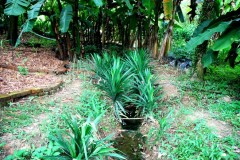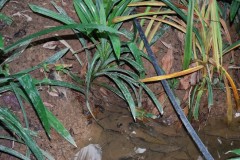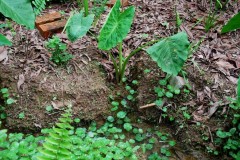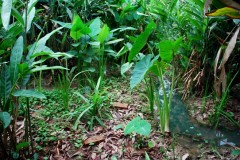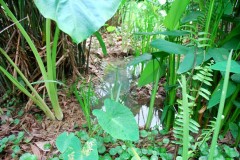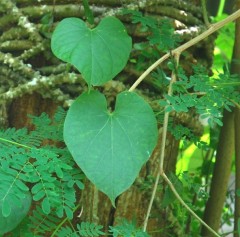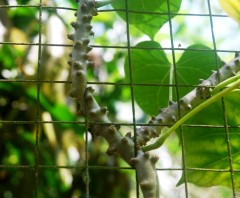Nov 28, 2010
Pandans and Keladi - Permaculture way
Most farms in Malaysia would have earth drains. Earth drains are cheap and quick to construct and allow rain water to seep into the earth as it makes its way to the rivers. Meander the drains to give the water even more time to infiltrate. It is one way to reduce flash floods during heavy downpours. Properly positioned earth drains will reduce erosion especially during our heavy monsoon down pours.
Pandan alongside an earth drain
One way to fully utilise the nature of earth drains is to plant water loving food plants along its course. To prevent the plants from blocking the flow during heavy downpours, we just add little inlets along the sides and in this instance, plant pandans (pandanus amaryllifolius) and keladi (colocasia esculenta ) in the inlets. The only maintenance is to quickly replant new shoots to prevent a clump from being formed (which will block the drains).
A plantlet quickly inserted into a new inlet to prevent clumps from being formed
Pandan leaves are used in aromatic Asian cooking and are always in demand by buyers.
Keladi being planted in inlets along the earth drain
Keladi tubers (taro) fetch a good price. At our farm, we grow the keladis with zero input - no pesticide, no fertilisers, etc are needed. When keladis are grown in wet earth, the tubers are twice the size of those grown on soil and watered.
Keladi producing edible tubers with zero maintenance. The picture shows permaculture features like mulching, companion planting, avoidance of monoculture, and fitting food cultivation to the character of the land, here, land with high water table.
More keladis and some edible ferns, which also love water.
17:27 Posted in Permaculture | Permalink | Comments (0) | Tags: pandanus amaryllifolius, colocasia esculenta, daun pandan, keladi, yam, taro
Nov 23, 2010
Useful Plants At The Farm - Patawali
Patawali is a climbing vine and can be planted wherever there's free vertical spaces
This is one of the most useful plants at the farm - patawali or tinospora crispa.
In Vietnam it is called the "vine with a genie's intelligence". In the Philippines, it is called, "to give life".
The leaves can be used as an insect repellant
At our farm, the plant has certainly given life to many an animal with indeterminate debility health problems and fevers. We have been successful with a dosage of about 0.07 grams of the stem per kg body weight for chickens and 10 grams for a goat of about 40 kg.
The stem is used for treating animals
We use this plant also as an insect repellant specifically for mites, aphids and hoppers.
To use, chop finely the leaves and spread around newly planted chillies and other vegetables to prevent insects from spreading viruses such as those that cause chilly leaf curl, at an early stage. Repeat every 5 days.
To make a spray, extract the active ingredients by fermenting the leaves and chopped stem in a solution of your own lactobacillus brew or if you don't have any, then EM is fine. After 14 days, sieve and dilute 1:500 times (can be stronger but watch out for the acidity) and spray on plants to get rid of the target insects.
A DQ discovery; as a mosquito repellent, just pound or blend some stem, filter the juice, and apply on bare skin. It has a pleasant herby aroma. Let dry and you will be mosquito free the whole night (with the possibility of reducing skin mites, and also, skin repair due to its antioxidant content). No necessity for toxic pesticides, or genetically modified mosquitoes. The juice can be kept in the fridge for weeks, making it convenient to use.
We also use this plant as an immune booster for ourselves when we feel under the weather.
(Malaysians interested in planting patawali for use as a natural mosquito repellant can write to me for cuttings for free. You pay for the postage though, or pick it up. Email us at hs_wong33@yahoo.com).
18:19 Posted in Useful Plants | Permalink | Comments (2) | Tags: patawali, tinospora crispa, tinospora rumpii, natural insect repellents, organic insecticides, organic miticides, mites, aphids, thrips, makabuhay, day than thong








